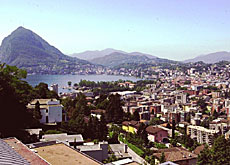
Swiss communes merge in struggle to survive

Switzerland’s communes, the backbone of the political system, are in a state of crisis.
Many have begun merging with one another in their struggle to muster the funds and the qualified staff necessary for survival.
Last year, a municipality in canton Thurgau published a series of adverts in the national press as part of its search for a mayor, after no local candidates applied for the post.
Many communes are facing the same plight.
In canton Graubünden, many local representatives are having to stand for re-election time and time again, for want of fresh candidates to fill vacant posts.
Earlier this year, the commune of Niederösch in canton Bern went one step further in forcing the local cheese-maker to become mayor. He had repeatedly stressed that he was not interested in running the 208-strong community, but was nevertheless voted in by the local assembly.
Public mandate
With 2,900 municipalities, Switzerland has more local authorities than any other European country.
But many of them – particularly the smaller ones – are facing huge problems in carrying out their public mandate of looking after local services and infrastructure such as schools and hospitals.
“Because the majority of Switzerland’s communes are so small, they often lack the staff and the finances to carry out their function,” says Sigisbert Lutz, secretary of the Swiss Association of Communes.
Compounding the shortage is the fact that many local authorities need highly trained representatives capable of handling increasingly complex dossiers such as unemployment, social services and financial planning.
“A system of voluntary administrators is no longer tenable these days,” explains Armin Nellen, a local councillor in Riederalp, canton Valais.
The new commune of Riederalp was formed last November from the merger of the villages of Goppisberg, Greich and Ried-Mörel.
Even after the fusion, Riederalp consists of only 560 inhabitants. Aside from Switzerland’s five largest cities, communes have on average no more than 2,000 inhabitants.
Rush to merge
Many local authorities have also been looking into the possibility of regrouping numerous communes into larger, regional authorities.
“But these new structures blur the question of who’s responsible for what and they themselves require more bureaucratic structures,” said Lutz. Mergers were therefore a far more efficient – and popular – option, he added.
The number of mergers has exploded in recent years. Some 250 communities merged between 1848 – the year modern-day Switzerland was created – and 1990. But there have been around 100 in the past 13 years, including 30 mergers last year alone.
The three cantons of Ticino, Fribourg and Lucerne are currently working at full steam to cut down the number of communes.
In Lucerne, authorities have launched a huge project to redefine local boundaries. The project is still in its infancy, but it foresees the amalgamation of dozens of communes into the city of Lucerne.
In Ticino, dozens of projects are being implemented at break-neck speed.
The lakeside town of Lugano is set to double in size in spring when it absorbs dozens of new communes to become “greater Lugano”. It will swell to 50,000 inhabitants to become Switzerland’s ninth – rather than 27th – largest town.
Cantons are offering a range of financial incentives in a bid to get communes to agree to the changes.
“Cantons which don’t offer incentives don’t stand much of a chance of success,” says Lutz.
swissinfo, Daniele Papacella (translation: Vanessa Mock)
In 1848, there were 3,205 communes in Switzerland.
There were 250 mergers between 1850 and 1990.
A further 100 mergers took place between 1990 and 2001.
Communes are responsible for local infrastructure, such as transport and roads, schools and hospitals.
They also have to look after social services and the local financial budget.
Swiss cantons are increasingly offering financial incentives to persuade communes to agree to being integrated into larger town and cities.
Other communes are choosing to merge with one another to overcome staff and funding shortages.

In compliance with the JTI standards
More: SWI swissinfo.ch certified by the Journalism Trust Initiative






























You can find an overview of ongoing debates with our journalists here . Please join us!
If you want to start a conversation about a topic raised in this article or want to report factual errors, email us at english@swissinfo.ch.